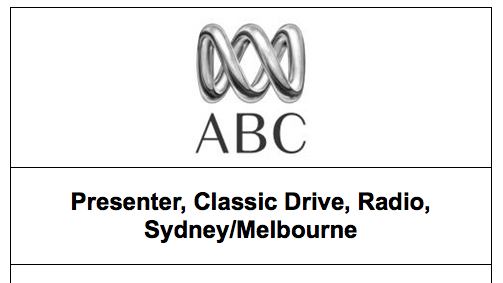In this week’s column, the ABC sends a high-profile Adelaide position east, someone’s bummed out by The Ghan, newspaper readership figures, and the ICAC’s secrecy has ironic consequences.
ABC Adelaide loses another top job
Long-time and much loved ABC Classic FM presenter Julia Lester has announced her retirement from Aunty – but her replacement won’t be broadcasting from Adelaide.
Lester has presented the Classic Drive program from here for more than a decade and, while she hasn’t been gratuitously parochial about her home town, local musicians and ensembles always enjoy an informed mention when she’s on air.
However, the job ad for her replacement (see below) stipulates that the position will be based in Sydney or Melbourne, which does nothing to ease local concerns that the national broadcaster is pushing the plum posts to the eastern seaboard.
Lester has been Classic Drive presenter for more than a decade, but first presented national ABC radio programming from Adelaide in the mid 1980s. She’ll finish in September and, once this position has gone east, it’s very unlikely we will see it return.
An ABC spokesman pushed the broadcaster’s Adelaide credentials, but said the Drive host needed to be closer to other prime time presenters in the eastern states.
“As a key program, the decision to nominate Sydney or Melbourne as our preferred location for the new Classic FM Drive presenter was made to give him or her close proximity to our other prime time program presenters to better aid collaboration & idea generation, and ultimately deliver a stronger audience offer,” the spokesman said in a statement.
“ABC Radio has a strong commitment to Adelaide, not only through our ongoing Adelaide based Classic FM staff, who are responsible for 30 hours of programming and presentation each week. These include three on air presenters (not including the retiring Drive presenter) and one casual presenter, plus our commitment through 891 ABC Adelaide (nearly 20 positions), Grandstand (three staff) and RN (two staff), who produce the Inside Sleeve and features for Earshot.”
Regardless, ABC Adelaide has lost a lot of positions and programming over the past year, including the entire TV production studio, the state edition of 7.30, and the state director.
Freudian train metaphors?
The Advertiser decided to illustrate its story yesterday about increases to fares and cuts to services on The Ghan with a picture of a bloke baring his bum (and, if you care to look carefully at the screenshot below, a stack of others).
We thought the full moon was last week?
X marks the apology
Sorry is clearly not the hardest word when it comes to South Australian senator Nick Xenophon.
This week, former Prime Minister Julia Gillard published a grovelling apology to Xenophon for erroneously stating in her autobiographical book, My Story, that he was “infamously excluded from university for a period as punishment for stuffing a ballot box full of voting papers he had somehow procured”.
Gillard retracted the claim, admitted it was false, and apologised.
In the media battleground which is politics, apologies are rare (except when they have legal implications, as in the above).
However, Xenophon has shown time and again that he doesn’t play by the rules. This week he issued a media release apologising for an earlier media missive in which he had a crack at Labor’s Tony Burke for saying Labor wouldn’t support Xenophon’s entitlements reform bill.
Xenophon discovered Burke hadn’t said anything of the sort – so he retracted the claim and apologised.
There should be more of it from politicians.
Newspaper readership: some bright spots
Readers continue to abandon most of Australia’s print newspapers but there are some signs of new life, according to the latest Roy Morgan survey.
As has been the trend for a long time, the figures for the 12 months to June 2015 show that digital readership is picking up for many publications, but not by enough to stem the losses in print readership which fell, overall, by 11.3 per cent.
Roy Morgan’s measure of seven-day cross-platform audience – the total number of readers who access a newspaper’s content via print, web or an app – has some good news, at least for a few titles.
The Sydney Morning Herald grew its total audience by 5 per cent, with a loss in net print readership offset by a huge gain in digital readers. The Daily Telegraph (up 1 per cent), The Age (2.7 per cent) and the Sunday Times (5.5 per cent) also managed to replace lost print readers with online audience.
However, most mastheads either couldn’t secure enough digital growth to compensate for print readership losses – or they actually lost digital audiences.
The Adelaide Advertiser, Financial Review and The Australian all lost readers despite digital growth, while the Herald Sun, Canberra Times and West Australian declined on both fronts.
See the full stats here.
Naughty corner
The intense secrecy enshrined in South Australia’s anti-corruption laws was designed to protect the reputations of the innocent.
This week, it’s having the opposite effect.
Independent Commissioner Against Corruption Bruce Lander yesterday released a statement announcing that a 57-year-old man from the eastern suburbs had been arrested and charged with two counts of abuse of public office. Lander revealed that the man was the chief executive of a “state government statutory corporation”.
The ICAC legislation prevents anyone from publishing details of its investigations, unless the Commissioner chooses to make a public statement.
When an investigation becomes a prosecution and an accused appears in court, the media may then report (unless there’s a suppression of course).
In this case, by failing to name the charged man Lander has effectively cast a shadow over numerous middle-aged male executives of State Government statutory bodies.
Until 21 October, and beyond if his name is suppressed, there will be widespread – and not necessarily accurate – speculation on the identity of the chief executive.
How is that in the public interest?
Top of the class
In this day of pain for all Australian cricket followers, there’s no better antidote than to read an assessment of the disaster from Australia’s best and most erudite sports journalist – The Australian’s Gideon Haigh. In this piece today, he has maintained his wonderfully elegant style despite the horror on the pitch. A brief taste:
Eighteen months ago, Brisbane’s Courier-Mail famously refused to use (England bowler Stuart) Broad’s names in their match descriptions, referring to him instead as an ‘England medium-pacer.’ Their front page tomorrow will need to be an entirely blank sheet, which may not be wholly inappropriate – a spell of eight for 15 needs as little elaboration as the Gettysburg Address.
Media Week is published every Friday.








